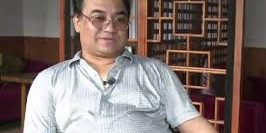A lawyer representing Uyghur scholar Ilham Tohti, detained on charges of separatism, says the evidence he has been allowed to review by the prosecution so far is incomplete, while Chinese authorities in the troubled northwestern region of Xinjiang (East Turkistan) have yet to clarify whether he will be tried in secret.
Tohti’s lawyer Li Fangping said he was invited by the Urumqi City Intermediate People’s Court on Tuesday to review the files of evidence against his client.
However, he tweeted via social media, some of the evidence was missing from the materials given to him.
“One issue was that we were unable to get a copy of the video evidence used in this case (footage from classrooms inside the National Minorities University) while the case was with the prosecution,” Li wrote.
“They kept using the excuse of asking their superiors, and wouldn’t tell us the reason.”
Another problem was that Chinese translations of original documents in Uyghur hadn’t been provided, Li wrote.
“Thirdly, there are a lot of pages missing from some of the files given to us on data disks, so we need to see the original documents to check this incomplete material,” he added.
Video evidence
Li told RFA in a later interview that the defense team is most concerned at not having seen some of the video evidence used by the prosecution to build its case against Tohti for “separatism.”
“The crucial thing is that we need to see copies of the video material, but they have been hemming and hawing over this,” Li told RFA. “We will continue to be in contact with them about this, to ensure that they sort it out.”
Another of Tohti’s lawyers, Liu Xiaoyuan, said the judge in charge of Tohti’s case had been “away on business,” for the past week, meaning that the defense team had had less time than anticipated to review the evidence.
Meanwhile, Tohti’s family are still in the dark about a trial date, and about whether they will be able to attend or not.
“The lawyer doesn’t know whether they are planning a secret or an open trial, so we have been waiting to hear this whole time,” Tohti’s wife Guzulnur told RFA.
“If the trial is an open one, the whole family will attend together,” she added.
Indictment
Tohti, who has flatly rejected the charge of separatism, which can result in the death penalty, was dragged away from his home in the Chinese capital Beijing by dozens of police on Jan. 15, and formally arrested about a month later.
He was officially charged in the Xinjiang (East Turkistan) regional capital’s Urumqi Intermediate People’s Court in late July with inciting separatism.
The indictment came as hundreds of Muslim Uyghurs, who call Xinjiang (East Turkistan) their homeland, were reportedly shot dead in fresh unrest in the region last month, although state media reported that just 96 people died.
Shortly afterwards, Wang Yu, a prominent rights lawyer on Tohti’s defense team said she was forced to withdraw from the case following intense pressure from her law firm and a lack of valid documents to present to officials.
Human rights groups have said that Tohti’s detention was part of Beijing’s broad strategy to drown out the voices of the Uyghurs, who say they have long suffered ethnic discrimination, oppressive religious controls, and continued poverty and joblessness.
Reported by Grace Kei Lai-see and Hai Nan for RFA’s Cantonese Service, and by Qiao Long for the Mandarin Service. Translated and written in English by Luisetta Mudie.






